#abrahamic mythos
Text
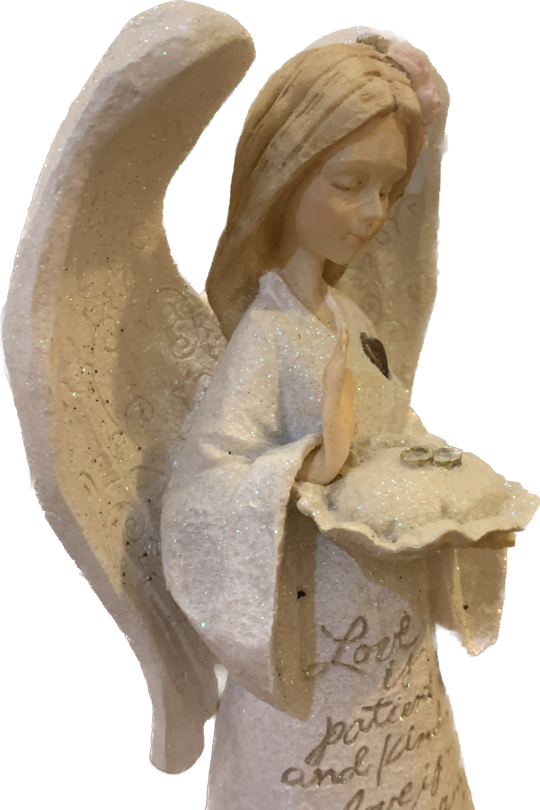
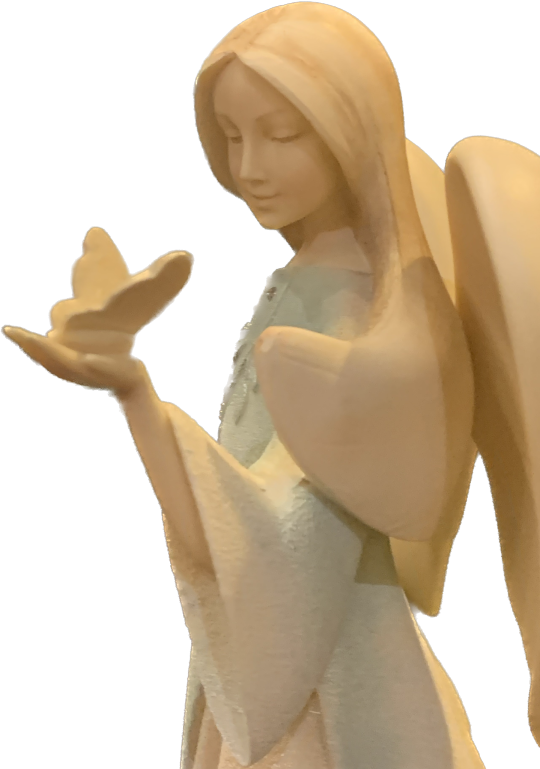
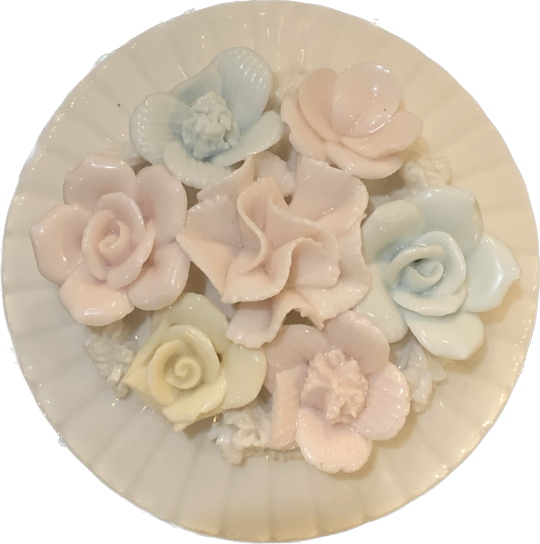
#angels#angelcore#angelic#soft#aesthetic#heaven#gentle#pastel#coquette#statuette#antiques#pottery#abrahamic mythos#art#jewlery box#PNGs#blog#roses#nostalgia#childhood#butterfly#layoutco
8 notes
·
View notes
Text
Oh my god he’s Van Helsing all over again this is just like the giant spider that drinks lamp oil
‘But millions of years before that, possibly a
forebear of this very fossil itself, Muenstero-ceras, an early ammonite,
existed in the seas of the lower
Carboniferous. Now to get back to survivals, Muenstero-ceras had a more mobile
and much more highly developed contemporary in those predawn oceans, a fish
called Coelacanthus - and yet a live coelacanth, its species thought to have
been extinct since early Triassic times, was netted off Madagascar in 1938!
Then again, though I don't refer specifically to these sorts of things, we
have the Loch Ness monster and the alleged giant saurians of Lake Tasek Bera
in Malaya - though why such creatures shouldn't exist in a world capable of
supporting the very real Komodo dragons is beyond me, even if they are thought
by many to be pure myth - and even the Yeti and the West German
Wald-Schrecken. And there are lesser, absolutely genuine forms, too, plenty of
them, come down the ages unaltered by evolution to the present day.
'Now, such as these, real and unreal, are what you might call "survivals", de
Marigny, and yet Coelacanthus, "Nessie", and all the others are geologic
infants in comparison with the things I envisage!'
#titus crow#cthulhu mythos#dracula#dracula daily#abraham van helsing#titus gets a little silly with it
3 notes
·
View notes
Text

YOOOOOOOOOO!!!!!!!
MYTHOS WITH NO MONUMENTS!!!!!!!!!!
MONUMENT MYTHOS!!!!!!!
(Or as my sister called this article, the Melting Mythos)
And the article is written by somebody called Looker as well!
Here it be.
For proof.
This shit practically writes itself!
It’s actually comical!
Jarringly so. Especially given the timing. Not a day after Alex issues a kind of apology.
Anyway.

*Numerous American landmarks are slowly eclipsed by a mysterious white light descending from the sky, and begin to fade away into it, as the sky turns orange, leaving empty space in their wake. Accompanied by a hauntingly poignant and touching grand piano instrumental reprise cover of Total Eclipse of the Heart*
*YOUR LOVE IS LIKE A SHADOW ON ME ALL OF THE TIIIIIIIIIIIIIIME!!!!!!!!!!!!!!!*
*all of the time*
*is abruptly cut off*


*mirrors lie twice*
Idk why but this is way more funny than it has any right to be.
I just hope to GOD it isn’t foreshadowing anything!
#dougie rambles#personal stuff#news#shitpost#political crap#my poor attempt at a joke#no context#this sounded funnier in my head#mister manticore#monument mythos#analog horror#mirrors lie twice#gifs#statue#abraham lincoln#heatwave#washington dc#wax#melting#alliteration#sculpture#oops#highbrow shitposting#weapons grade shitpost#total eclipse of the heart#needlessly ominous#climate change#extreme heat#life imitates art#art imitates life
1 note
·
View note
Text
Ok, mythology update!
Not that I've developed it even more, but just that I felt I needed to post something.
I mean I have developed it more, but those aren't gonna be in this post, y'all get to hear about the bear later.
Today we're talking about Keira, a god made of dreams.
So! First things first, Keira wasn't originally a god. Unlike Keter, Keira wasn't an essence that actualized, and unlike the Morning Star she didn't realize a new essence and then actualize.
Keira is the daughter of one of the Chayot. This Chayot was named Typhon. Typhon was the first to acquire and preform the duties known as the 'Scribe of Heaven.'
Typhon was essentially the keeper of a book where everything is written, and what Typhon had to do was keep a record of all abstracts and essences circulating across all primordial systems.
Typhon eventually settles down on Deus and gets married. They are one of few Chayot who were not called back to Eden during the War of Saints and Demons. Of these that stayed behind, Typhon was the only one to survive after the contradiction essentially severed their connection to Eden, thereby making it so that they lose their essence.
The reason Typhon was able to survive was because of the book she carried, as upon seeing the contradiction and how it was written, Typhon was able to realize Omnos. Omnos, on a technicality, is recognized as an essence. However, it, in nature, is placed much closer to the idea of space between matter. Omnos, per its derivative from the prefix Omni, means it is what encompasses all. It, by nature, is an essence that encompasses everything that is not an essence: Laws, Principles, Abstracts, Primordials, Outers, etc.
Yes, primordials do also classify as essences, but they are also very different in nature for their own reasons.
This sort of essence means essentially to exist without essence, or by all that is not defined. This is a hefty power because things like Abstracts are not defined by nature. Fundamentally they are the definers, they are meant to be proven and prove, but what exactly they are is, in accordance to its namesake, abstract.
Due to this, Typhon developed a deep appreciation for the stars and constellations, because as mentioned before they represent the stories by which these abstracts came into existence.
When Typhon eventually gave birth to her daughter Keira, Typhon passed on this appreciation, and her essence of Omnos.
Not so long after, Eden started to be able to slightly breach the contradiction. While they couldn't come in droves and masses, they were still able to send a single powerful envoy or two at a time. Upon finding Typhon, and seeing her switch out of Mythos, Typhon was labeled a traitor and executed.
They never discovered Keira, but a Chayot, Metatron, then inherited the role as the 'Scribe of Heaven' and due to the nature of the book he inherited, did know of Keira's existence.
For later to be revealed reasons, Metatron kept Keira's existence a secret. Keira then grew up alone with her father. Her father had a burning hatred for Eden of their actions. While Keira was also mad at Eden, she did vindicate Keter, knowing this was probably done without Keter's knowing or orders and more done on the part of the masses who'd just experienced a war due to a Chayot's essence switch.
In his hatred though, Keira's father ends up succeeding his story, attempting to kill an envoy from Eden, and creating the abstract of duality. Keira, at the age of 11, is left to fend for herself.
Keira wonders the lands for a very long time, as she grows more attuned to her Omnos the slower her body grows and ages. By the time she'd physically reached maturity, around the age of a late twenty year old, she'd been alive for multiple spans of a thousands years. She'd made friends with the great bear of Ursa, watched the formation of the open maw of Laeva, saw the end to the great serpent, watched the birth of the arbor, and came to know everything there was to know about Deus.
During this time period, Metatron would approach her multiple times. Metatron would ask her to try and write in the book, theorizing that with her essence she could change and reach metaphysical and cosmological depths beyond even the primordials.
Essentially, Metatron is an aspect of Chaos, and believed that Keira would be able to unite the First Moon and the Last Sun.
Keira, however, refuses him time and time again. As in uniting the two, she'd put and end to all stories, which again she and her mother deeply appreciated and loved. As she witnessed the beginnings and ends of every great story, those known and forgotten, that love grew into a form of hunger. Just as the empty space in between holds the stars, she wanted to hold the stories.
Due to this, Keira wanted to discover what made a story, and set out to succeed her own.
Keira went around the world, and started to handpick those developing stories that she loved. In gathering all these people, she developed a kingdom known as Centriscele. As the Kingdom developed, the land of Centriscele started to shift, the Mythos it was originally made of slowly shifting to being Omnos. Keira, instead of creating out of Omnos, was able to transform other essences into Omnos.
This gave Keira the idea that, if her kingdom extended to the Firmament, perhaps the firmament too could come under Omnos' influence, and perhaps she'd be able to bypass it. So, she built a tower that extended all the way to the firmament.
Becoming a new kingdom on Deus and a powerful one at that, Centriscele caught the attention of Eden. Metatron sent down an envoy, hoping to systematically cover Centriscele up, as he was still trying to find a way to either use or convince Keira. However, the envoy is terrified by what they see, still scarred by the War of Saints and Demons, and instead of reporting to Metatron they report straight to Keter with a heavily biased message.
Keter is put under the impression that the Morning Star lives, and is attempting to conquer Deus. Keter is enraged, and takes a massive hit from Probability in order to briefly break through the Contradiction, sending down its Wraths to level Centriscele. This ends up separating Centriscele from the rest of Deus, putting it on its own isolated plane of existence, separating Omnos from the greater world of creation.
By consequence, Eden can no longer sustain Keter on its own, and the Theophany process begins.
Either way, the moment the Wraths are sent down, Keira stretches her control over Omnos as much as she can. In an internal world in her eyes, she creates a replica of her kingdom, of all the land currently identified with Omnos. This includes a portion of the firmament. Then, she is able to transport all of her denizens into this internal replicated kingdom.
This is done in the blink of an eye, to the point where all but twelve people don't even know that the kingdom was about to be assaulted by Keter. After doing this, Keira manages to maim Keter and take his eyes. Finally, Keira creates a replica puppet body in her internal world, and then transports her own consciousness into it, so that she can continue to be with her kingdom.
Keira's true body falls into a deep and eternal sleep, succeeding her story. Due to her possession of Keter's eyes, the Wraths would not attack her, and so lay dormant in the spears that they came down in. Anything that would then enter Centriscele that is not Omnos though, they would reemerge and tear apart whatever it is.
As she has her own essence and succeeded her story without being subjected to the Probability, Keira should go under the process of actualization and become a proper God. However, she doesn't. Due to the separation of Centriscele from the rest of existence, the abstract she created cannot influence the rest of creation, and therefore doesn't prove anything. Additionally, the abstracted she created is Eternity, which is already an aspect of Time that, in nature, is unable to define anything as it is beyond perception.
So the abstract she created can't influence existence, it can't prove her essence, and technically already exists. If it already exists though, how did she create it? This involves a time paradox on account of the nature of eternity. In order for eternity to exist, it can't have a beginning or end, and yet it must be created all the same. Essentially, Keira created eternity so that eternity existed even before its creation.
Additionally, while eternity is her end, eternity itself does not have an end. In fact, it cannot end, and therefore exists not by the natural Laws, but rather by the Contradiction.
Keira constantly remains on the edge of Godhood, and yet is much more powerful than any God would be. Additionally, as she falls into an eternal sleep, I can slap on the 'Most Ancient Dream' moniker and nerd out about ORV.
This covers the three Greater Gods:
- Keter the Crown
- The Adversary the Morning Star
- Keira the Most Ancient Dream
There are then lesser gods. These gods however are lesser due to the implications of their existences. These are gods like any classic pantheon, where each god is limited to a domain. The three greater gods however have complete influence over all of existence and specifically they have metaphysical influence, where the lesser gods don't.
There are some Gods that have come close, but for right now we'll leave the lore drop on the last of the big three. This brings us to the main story, which explains how Keira and Uriel and Samael happens.
#Keira was my favorite of the Gods to make the lore for#because obviously the other two are just fanfiction parodies of abrahamic mythos#but outside of the title of the Most Ancient Dream#Keira is entirely original#and I'm pretty proud of the intricacies of her story and how it ties into the greater world
0 notes
Text
In Early Modern China's nearest attempt at writing a Rick and Morty episode, the lads visit an all-female kingdom and get boypreggers by guzzling from the wrong stream. Luckily,

I see we're leaving nothing to chance here.
Pilgrim Sun suggests that the births, if unaverted, will take place via a painful tearing-open of the armpit, of all places. Journey to the West Research compares the chapter to an episode from the Mahabharata (in which a king mistakenly drinks holy water intended to give his wife a son) and the choice of birth canal to stories of the legendary sages tearing open their mothers on the way out. Compare and contrast.
Oddly, it's sort of unclear why Western Liang is like this. It doesn't seem like a matter of policy, they're not Amazons and they're practically exhilarated to lay eyes upon our boys. Yes, it's a "male-undoing mountain", but there's no other indication that either the stream itself or the women are sex-selective.
As far as I can tell, this place exists so that Tripitaka can refuse to have sex with the most desperate queen alive — certainly a betrayal of his cicada namesake, but a chance to demonstrate his extreme commitment to virtuous celibacy and family-renunciation while playing his general meekness for laughs.
All that notwithstanding, I think the kingdom and its inhabitants are treated with remarkable respect. Yes, yes, they're desperate for the yang, clearly, but it's also a normal, functioning kingdom of impressive wealth. It has women officials who fulfill all the usual functions of a Sinosphere state, and their capacity to do so is not really commented upon or made ridiculous, at least not in any way that's legible to me. It's just that their entire society temporarily reorganizes itself around getting their superlatively beautiful queen into bed with a shy, celibate monk who needs and wants nothing more than to have his passport* stamped. They want him to stay, marry, and be king. He is defined by compulsive journeying and rejection of his role as paterfamilias. Classic comedy. Compared to the Amazon mythos or Lysistrata, the whole thing actually comes across as less pathological.
*Really, it's a travel rescript — a letter presented to the local government and signed to guarantee safe passage. Securing the travel rescript is a convenient device to force the characters to interact with the weird politics of the kingdoms they pass through.
Note also that abortion is presented as an uncomplicated and uncontroversial good, but that's probably the non-Abrahamic default.

Obvious commentary on the ongoing FDA abortifacient controversy.
Fruit baskets!
Always the bloody Daoists
Fruit baskets
After their plan to get the passport signed and leave the bride at the altar flubs, Tripitaka is promptly and perhaps serendipitous kidnapped by an unrelated scorpion, but his commitment to semen retention is, once again, simply too powerful, though she tempts him with remarkable persistence and buns filled with human meat. (She ties him up at one point; I'm sure there's fanfic of these two.) Ms. Scorpion does, however, accomplish the nigh-unprecedented feat of landing blows on both Sun Wukong and Zhu Bajie in a fair fight, #feminism, before being destroyed by the Chinese equivalent of the constellation Orion (here appearing as a very large chicken).
I'm not sure what we learned from this one and I certainly don't have anything intelligent to add, but damned if it isn't funny.
129 notes
·
View notes
Text
Knowledge as a Burden / Subjective & Objective Truth :: A S5 Meta
Now, the concept of Knowledge being a burden is nothing new. It's quite literally baked into cultural consciousness (at least in the West; I don't know enough to speak for East cultural mythos) through both the story of Adam and Eve within the three Abrahamic religions, and its close sister story of Pandora's pithos (more commonly known as a box). We also see it in stories such as Bluebeard, in which a new wife is forbidden to inspect her husband's private chambers and deeply regrets her choice to do so, as well as phrases such as "the grass is always greener on the other side," "ignorance is a bliss," and "what you don't know can't hurt you" (all of which are debatable as phrases, of course).
However, it is one of the rare themes in TDP, I think, that wasn't really present in arc 1 and is introduced as an arc 2 (as compared to most that were already in arc 1, and have just been strengthened/matured) particularly as of S5, hence why I wanted to talk about it.
So let's talk about it (specifically Kpp'Ar, Akiyu, Viren, Rayla, Callum Ezran, Soren, and the Jailer, not at all in that order).
Thematic Origins
Like most things in terms of season four thematically, "Knowledge as a Burden" actually starts in Through The Moon, in a lot of ways. There's the other side of it as well - not knowing what happened to her family or Viren is causing Rayla to be increasingly irate and worried - but TTM closes out on Rayla at least being able to face the fact her family is gone. If that was the only big piece of information she'd learned by going through the portal, she probably wouldn't have left.
R: Right before you found me, he opened his eyes, and I knew... He may be caught between life and death somehow, but Viren is on this side of things. He's alive, Callum!
C: I don't know, Rayla. I didn't understand half of what I saw in there. [...] I let you jump into the Nexus alone and I knew right away I'd made the biggest mistake of my life. I could have lost you.
However, she Knew - in her bones - that Viren was alive, and so she had to go after him. Even if it wasn't what she wanted (to leave or to hurt Callum) the knowledge itself felt like it was pressing down on her, that this was what she had to do. That she had no other choice.
That being said, TTM is at its core supplementary material. While it initiates the theme in this way (as does Callum's devotion), it may be worth turning to how S4 originates the theme and pursuit of Knowledge, which is not through Rayla directly, but is through Callum, instead.

(If you're interested in Amaya and Callum's parallels in 4x01 concerning partners and knowledge, you'll want to check out this meta here.)
In the beginning of S4, Callum is where Rayla used to be, left in limbo about the well-being and what's happened to his loved ones. And there is, of course, his frustration and quest to properly decipher the mirror, and anger at Soren, when he believes the man is keeping something from him.
This anchoring in Callum's plot line and curiosity indeed informs the true thematic basis of knowledge in Arc 2 in comparison in Arc 1. In the first three seasons, we always knew where we were going — to the Dragon Queen to notify her of Zym's safety/existence, with Viren's initial Aaravos plotline in S2 being a divergence from this level of certainty — but in arc 2, we're purposefully floundering a bit more. Because in a lot of ways
Arc 2 is About the Pursuit of Knowledge
This isn't particularly a surprise, given the seasons have the official title of "The Mystery of Aaravos," and mysteries involve clues that are in the inherent pursuit of trying to gain answers (i.e. knowledge), but it does mark a structural departure from Arc 1, as mentioned earlier, and informs S4-S5 (and most likely S6) more than we might've initially realized.
A perfect example is that, from 4x05 onwards, the main characters (including Claudia and co. until the of 4x09) up until approximately the end of 5x05 (a full 10 episodes) are simply travelling around trying to find the pieces to Aaravos' prison. To decipher its location, its material, and its very nature. But put a pin in it for later, cause I want to draw attention to another quest for knowledge that runs concurrently in season 5 in particular, AKA:
Knowledge as Power
I've talked before about Finnegrin's parallels to Aaravos, but thus far haven't touched too much on Callum's parallels to Finnegrin, even though they're uh


There, for sure. And of course, both Finnegrin and Callum (and Rayla, with her "We're going to need to know one thing: how do we kill a Startouch elf" + Finnegrin's "I just want one thing") have their own similar reasonings, ultimately, for wanting to kill their chosen targets: to maintain their own control and freedom.

(This isn't to say this is Callum's exclusive motivation regarding Aaravos — it isn't — but I do think we're meant to see the blatant parallels as well.)
Control, freedom, and power are all undeniably, understandably linked, then. But knowledge is the undercurrent (pun intended) of all of it. Finnegrin's awareness of his confines is what's driving him mad; Callum knowing that Aaravos can possess him and what the mirror entailed, things he lived in ignorant bliss of for 2+ years, are what worries him in S4. Knowledge and power are inextricably linked, as Viren's character makes particular apparent, which in the case of Kpp'Ar demonstrates a strong Knowledge of his student (with caveats) as well as Aaravos' assessment of Viren. If you have knowledge, you have power — and if you have power, you have agency and/or worth.

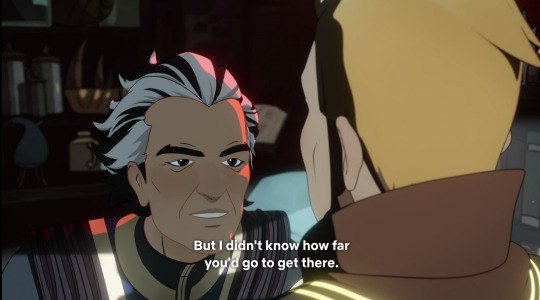
Which I think is the subtextual cue to Viren only having clarity ("This is nonsense!") once he casts down his crown (power) in the dream sequences, as well as his end of season "I finally see the truth" epiphany that also comes with relinquishing power and agency over his own life, while ironically exerting it more than ever. But more on Viren and all that later, so pin in it for now.
We also see this element of Knowledge as power come into play with other characters, most notably Claudia in her utilization of dark magic and the creativity she expresses with it, Callum's knowledge of spells, and even Ezran in S5:
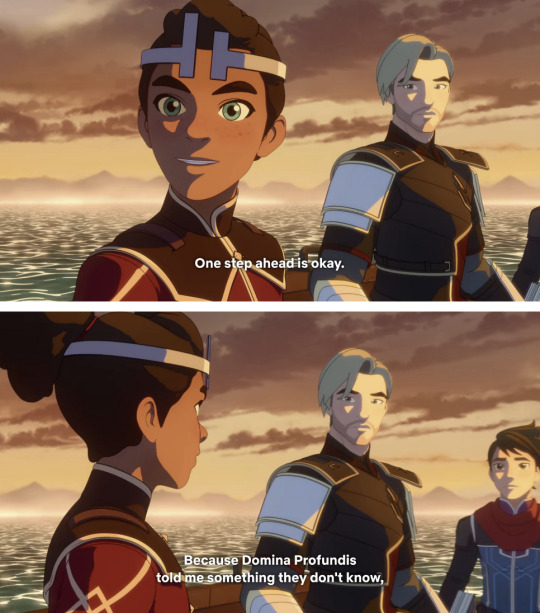
However, knowledge in the 'traditional' sense in show isn't solely about magic or spells or prisons, or even overtly negative. There are far more positive sides as well (even if, like most things, it's a double edged sword). So let's talk about
Knowledge as Self Actualization
Have talked about self actualization in regards to Callum and Rayla's individual development in Arc 1 a few times in overlapping ways, so not going to repeat too much here (each of them examining themselves but also one another's worldview - of the cycle and magic/the war - in order to reach the people they were meant to be in many ways, etc), although I am going to touch on them later as per S4 and S5 again.
For a fresher example, I want to talk about Soren.

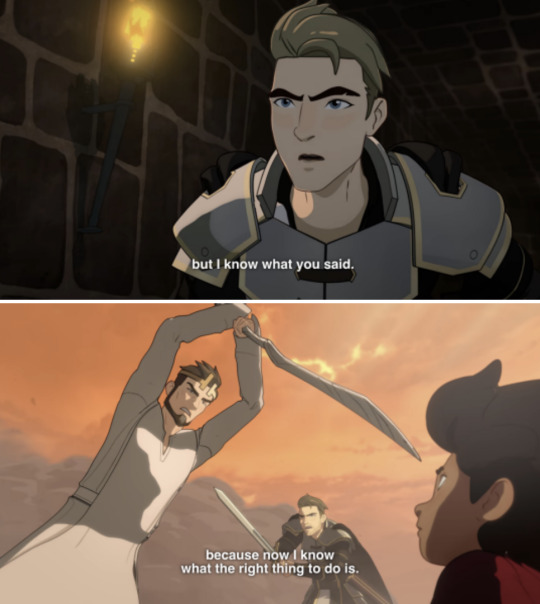
Dictionaries define self actualization as the process of becoming your fullest self — often times conflated with the best version of yourself — where you become more You than you ever were before. This is especially true for both Soren and Rayla in arc 1, where although they have dips and bends, they are both ultimately selfless protectors secure in the duties they've finally been able to fully choose (and to make up, to themselves, for prior failures). For Callum and Ezran, their self actualization is more transformative into someone entirely new — more confident, more assertive, more compassionate and with the power to express it — than restorative, but again: put a pin in Callum's arc for a bit, cause we're getting to it.
For now, let's talk about self actualization through recognition of yourself through the other (aka in this case, how Callum and Rayla view themselves through the other's eyes in S4 and S5) as well as love being both a subjective and objective truth (with some moon arcanum stuff for spice).
So objective truth is things that are undeniably real — magic exists in Xadia, Aaravos has been imprisoned. Subjective truth is whether Aaravos was imprisoned for a good reason, or that humans can't access primal magic; these can change depending on viewpoint or access to new/old information. For example, while Aaravos likely isn't lying about what he believes will happen ("The sun will rise and you will not") that doesn't make it objective reality; just because someone is telling their truth and perception of events does not make it unilaterally The truth.
But for a more interpersonal view...
In season four, just like Callum doesn't know if Rayla is alive, he doesn't know how to feel about her coming back. Rayla hopes that they can reconcile, but she also knows that her leaving hurt him — even if Callum won't admit it. She had her reasons for leaving and he has his reasons for being hurt, and although somewhat opposed, they can both exist. This follows what Lujanne and Ezran cite, i.e.:
Lujanne: Sometimes real trust is accepting even the dark parts we will never know. [..] Was it wrong? Or was it just differently true?
with notions of subjective truth, and Ezran's assertion of his truth that
But I think I left something out. I ignored something that was true. I denied something that is undeniable. We are angry! I am angry. I have been hurt. [...] But… It’s not that easy or simple. Because people are still hurting and they are still angry. We can’t ignore that, or pretend it will go away. Somehow, we have to hold it all in our hearts at the same time. We have to acknowledge the weight of the pain and loss, but open up our eyes and allow ourselves to hope and maybe forgive and love again.
Whether one has hope or not that the world can be different often times indicates whether they will be breaking the cycle or perpetuating it. We see these conflicting realities once again with Soren and his inability to get through to Claudia ("You're on the wrong side. I know because... I was too")

versus being able to successfully get through to Elmer:
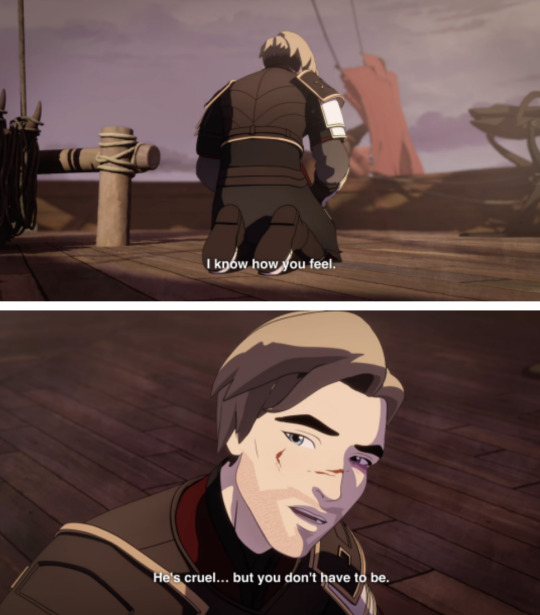
When you can empathize and relate to others — which is a cornerstone of Amaya's growth as well across season three through to season five — you can lend understanding and self-actualization not only to yourself, but also to them: "You know who you sound like?" "Who?" "Me" much in the same way Soren is able to offer it to Elmer, and Elmer reasserts his own identity — his understanding and knowledge of himself, down to his name — accordingly in addition to becoming an ally.
Knowledge is also the foundation of consistency; how well we know someone is predicated on how well we can predict their behaviour and subsequently rely on them, not only in action but also in reaction and responses. There's few things more disconcerting than someone reacting poorly to something you thought they would take rather well. Moreover, if knowledge of ourselves can lead to self-actualization, then our knowledge of each other can also lead to mutual self-actualization. We see this first hand in Rayla and Callum's Arc 2 dynamic thus far, so let's talk about it:
Mutual Love as Self Actualization: Part 1 — Uncertainty to Certainty (S4)
As previously noted, Callum starts out S4 at both a loss with the mirror, and still coping with the uncertainty and stagnation of his loss of Rayla. When Ezran reaffirms that Callum still loves her, all Callum can helplessly rely that he doesn't "even know if she's alive." Things don't really improve once Rayla shows up, either, even if we see the persistent thread of not knowing vs knowing being knit throughout their arc with one another.


We see this knit through, lightly, in Janai's arc regarding her people and place as queen ("Elves and humans [moving too fast]? ... I don't know" "At least Karim would lead with some kind of certainty") as though uncertainty is nothing but doubt, rather than a journey involving doubt as well as the opportunity for growth just as much as any venture (as Callum and Rayla will soon find out).
After all, Callum soon finds a shred of comfort in said uncertainty, and offers it to Rayla accordingly in an attempt to comfort her:
Rayla: This is all my fault [that Soren is dead/missing]. I left him alone! I shouldn't have—
Callum: Rayla. Don't. We can't know what happened for sure. I mean, this is the path to Rex Igneous, right? So maybe he couldn’t climb out of the pit, so he had to keep going. You know him. He’s brave. He’s gotta be down there looking for Rex.
And this is also built upon a foundation Ezran has set earlier with his friends. When he is trying to get Callum and Rayla to work together, he doesn't tell them to set everything aside, or even harkens back to their good old days. He asserts their identities and says, "Don't you remember who you are?" because to him — and evidently to Callum and Rayla, because it works — working together and helping each other has become a fundamental, core part of who they are as individuals. They are that interwoven with each other, and Rayla reflects that in 4x07 with, "Callum, you're the 'destiny is a book you write yourself' guy. No one can control you or make your choices for you" as well as what Callum offers up to her in 4x09 where we see the turning point in their prior uncertainty. Although they've both changed, they are fundamentally still the same people they were when they fell in love, and there is both comfort, sadness, and acceptance in that realization, where Callum says:
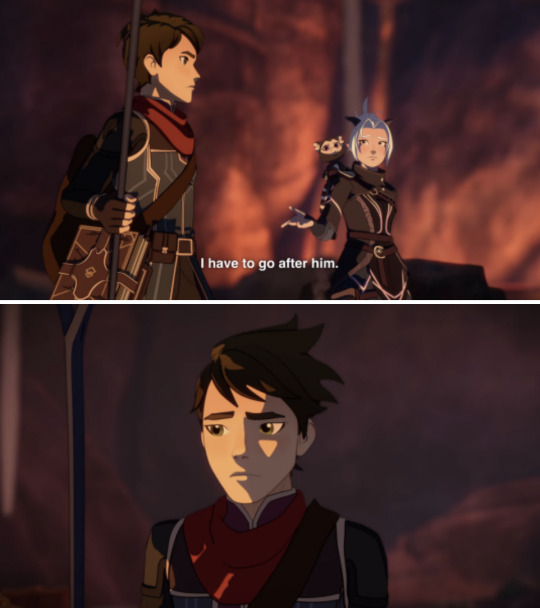
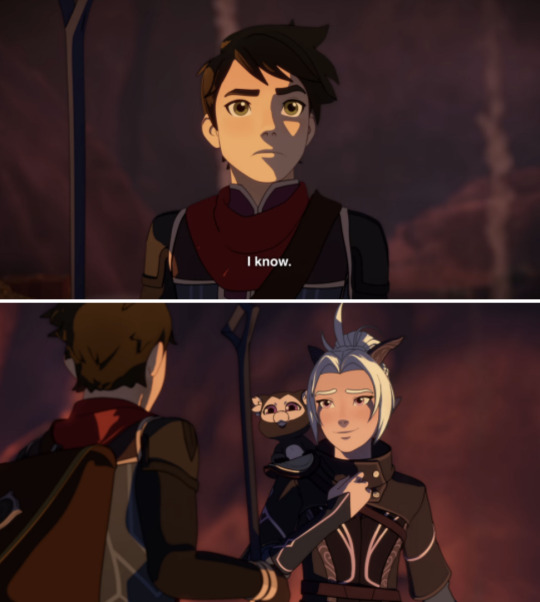
Which is the tipping point into season 5, and where they stay for the bulk of season five, so let's talk about that next stage.
Mutual Love as Self Actualization: Part 2 — Certainty and Discovery (S5)
Upon reconciling once Callum has said what we knew all along — "I'm so glad you come back" — Callum and Rayla return to the castle, and their searches for knowledge become arguably more explicitly stated by the text. Their first scene together in 5x01 establishes that Callum wants to know the Ocean arcanum ("I thought it would be about controlling the tides or fighting the currents" thereby exerting control, which he desperately wants over himself post-S4) as well as Aaravos, whereas Rayla is seeking answers about her family: "If I can figure out how he put you into the cursed coins, maybe I can find a way to get you out."
This is, of course, something we know she doesn't trust Callum with yet, not wanting to burden him with her problems especially before she's reached her own conclusion of what to do about it (to delay it for the good of the world) and we see that the certainty and forgiveness Callum found in 4x09 has more than carried over.
Opeli: Don't you want to know what she was up to? Why she did all this?
Callum: If she didn't tell me, she has a good reason. I know this: the tides are true as the ocean is deep. [...] It means I trust her. Unconditionally. Let her go. Now.
This scene harkens back not only to the love poetry he quoted and then paraphrases ("To love is simply to know this") where loving and knowing someone is deemed synonyms, but also by his reassertion of Rayla's identity in the wake of her transgressions and her silence: "She's not the elf. She's Rayla" because Callum's love for (and trust in) her has always been rooted in the essence of who she is: "That's what makes her a hero. That's what makes her Rayla."
And we see Rayla's own knowledge of certainty challenged and reformed by Amaya in 5x04:
When I was growing up, my big sister Sarai was the smartest, strongest, bravest person I knew. When she died, I felt lost and weak without her. I hated feeling that way, so I learned to be strong alone. Stoic, strong, and lonely. [That does sound like me sometimes.] But the last two years have changed everything. Meeting Janai, falling in love, I am stronger than I ever was — because we are stronger together. And I realized that was the real truth of me and Sarai too.
Love and trust grow a kind of strength that is much bigger than we each possess. To have that kind of strength, it is not enough to love someone. You have to trust them to share the burdens you carry.
And although very uncertain about opening up, Rayla still expresses certainty that she knows Callum could and can be there for her, if he wants to be — if he's ready to be.
Rayla: But I think — I know that I trust you to help me carry this. If you're okay with that?
This is, after all, with both Amaya's encouragement and Callum's reassurance that 1) "You can tell me when you're ready" and that 2) he does want to know from 5x01. Then, we see both their arcs in this way largely — or at least they would, in a perfect world — be resolved in many ways by their interaction later in 5x04:
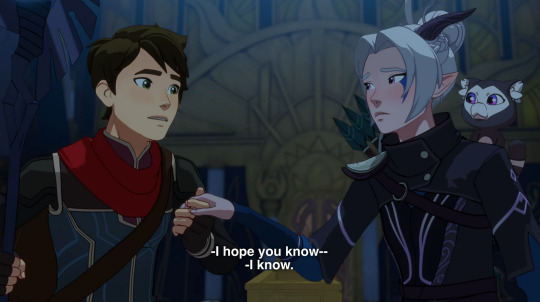
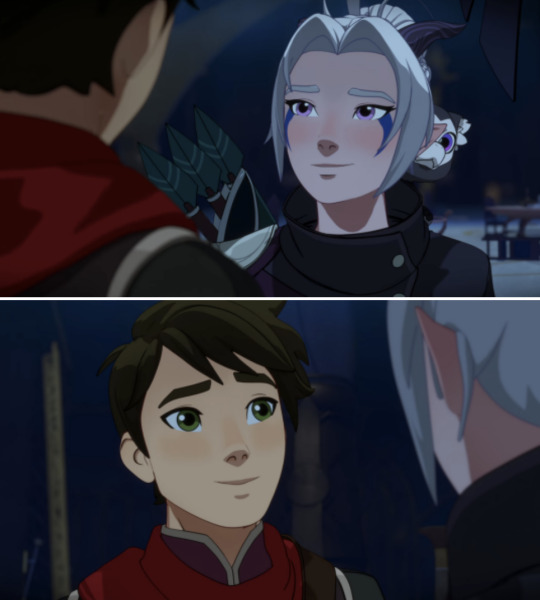
But that's not where their season 5 arc ends, because 5x08 happens. To talk about that, though, we have to talk about a few other things, namely
Oedipus Rex
Bear with me, because I promise this relates. "Oedipus Rex" is a 5th century BCE Greek tragedy written by Sophocles, detailing the life of a man who's name is mostly (ironically) known for lending itself to Sigmund Freud's Oedipus complex theory. The play and myth itself, however, indicate very much the opposite. Prophesied to murder his father and marry his mother, both Oedipus and his parents are accordingly horrified by his apparent fate, and do everything they can to remove it as a possibility, including abandoning their baby to die on a mountainside, as well as Oedipus leaving the home of the family who saved and subsequently raised him, never realizing he was adopted.
He then goes on to discover the truth of the prophesy when a plague wracks his city that the seers say will not leave until the murderer of their king is found, and Oedipus unknowingly pushes until the point of revelation that it was himself, and that his wife for many years is actually his mother. Even when other characters, such as his mother turned wife, Jocasta, begin to suspect the truth and urge him to stop chasing down the mystery so they can have plausible deniability, Oedipus remains oblivious until the horrifying truth is staring him in the face. Jocasta hangs herself, and he gouges his eyes out and runs off into the woods to die.
The reason I bring this all up is because, in the Western literary canon at least, "Oedipus Rex" is considered the "ur-text," otherwise known as the text that all others are modelled after. Not necessarily in the incest or the tragedy, but the fact that most if not many Western stories (TDP included) are continually propelled towards the point of Revelation or epiphany, and that this revelation is inevitable, whether it is positive or negative.
While Viren and Harrow give an excellent display of a relationship that breaks down due to a lack of understanding and compassion, as well as self-doubt on both sides...
Harrow: Call it what it is. Dark magic [...] I've spent years going along with these creative solutions, and where has it gotten me?
Viren: I don't understand.
Harrow: I know you don't. Leave me.
Viren: They will find you and they will kill you.
Harrow: I know this.
Viren: But know this: anyone of these men and women would gladly trade their lives to save yours.
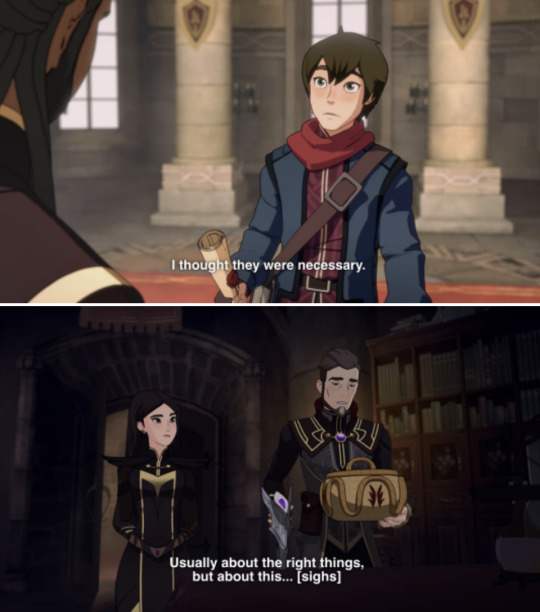


Likewise, we see Viren through his dreams seek the form of acceptance ("I hope you know--" "I know") that Rayla has offered Callum, except from Harrow, as well as going further into what Viren has deeply wanted for most of his life and from Harrow in particular; to be listened to, to be valued. (How pure that is in practice is debatable given their dynamic outside of Viren's dreams, i.e. Harrow listening to you does not always mean agreeing with you, but I digress.)
Harrow: You are a brother. You're my family.
Viren: I've always thought of you as my family, and you know, I would do anything for my family. However dangerous. However vile.
Harrow: [Still hugging him] I know.
Viren: It is everything to me, to know that I mean something to you, to know that I matter. It's all I ever wanted.
But what should be a scene of comfort and reassurance turns into a literal nightmare. Into entrapment. Into imprisonment.
Knowledge as a Burden / How Knowledge Can Imprison You
I've said before that Arc 2 is about the pursuit of knowledge, specifically because more than the mystery of Aaravos himself, the bulk of the main characters are trying to unravel the mystery of his prison. Season five, by virtue of offering more clues (the nature of the prison, its appearance, and its location) also reveals more of the layers in both the construction of the prison and the dispersion of the clues. Even the mighty Domina Profundis states, "I do not know where it is," but that "I do know what it is."
Previously, we've mostly talked about knowledge, especially within the text of the show, as a positive thing. It is the foundational rock of a strong relationship, it can lead to positive self actualization, and it helps the heroes keep Aaravos from being unleashed. When you do not have enough knowledge or perceived understanding of someone (Claudia assumes Soren could never understand her, and Viren and Harrow's relationship breakdown), your relationship accordingly deteriorates. When you share knowledge, and share experiences (Rayla to Callum about the coins, Soren to Elmer about abusive cycles), you can become stronger together.
But knowledge is not exclusively a good thing. It can also be harmful, or unwanted, or unwanted precisely because it's harmful. It can bind you to deals or bonds you don't really want, and once you know something, you cannot un-know it, whether about yourself or about others. And we see this most plainly in the story Archmage Akiyu shares about the prison.
Because Aaravos was a master manipulator, the Jailer knew all knowledge of the prison had to be protected... its location, its material, its very nature. She carefully divided information about the prison so that not even the Archdragons had the complete picture. Each knew only a piece. "The puzzle is the real prison," she told me with a proud smile. But I made a fatal mistake.
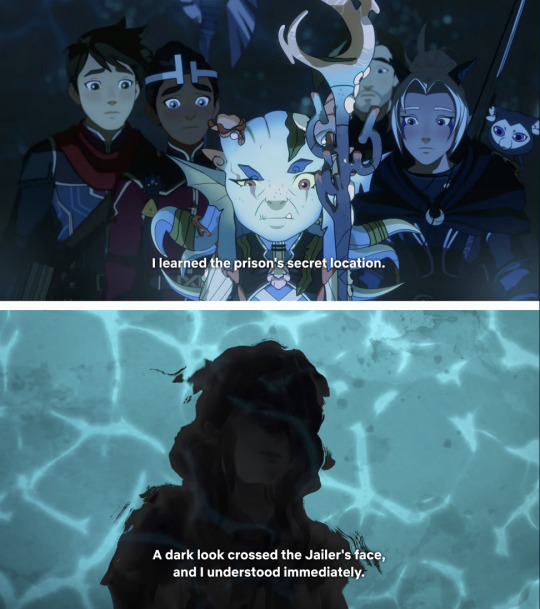

Akiyu didn't mean to look. She didn't mean to discover, to know. What should've been a noteworthy accomplishment of being trusted to keep the world safe, so it would be a better place for her and others to live in, nearly spelled her doom.
I begged her to let me live. I swore to keep the secret safe, but she said it was too important. "The archdragons will have to kill you," she told me, "to protect the puzzle, to secure the prison."
There's a few interesting things here. We can see, from the severity that Akiyu holds regarding her oath, that the Jailer was genuinely concerned about making sure the prison would hold Aaravos, in addition to the fact that Jailer would be condemning Akiyu to death without having to bloody her hands herself. But the intensity here does make sense; as she just said, "the prison is the real puzzle," and now that's been potentially compromised.
We even get a bit of bonus foreshadowing, as Callum turns to look at Rayla, indicating he hasn't forgotten what he asked her to do in 4x07, and that him gaining more knowledge about Aaravos (or the key?) may not necessarily be a Good thing.
Rayla: [About the cube] It's a toy. A piece from a children's game. I hope it was worth it to you, putting everyone's lives in danger (1x04).
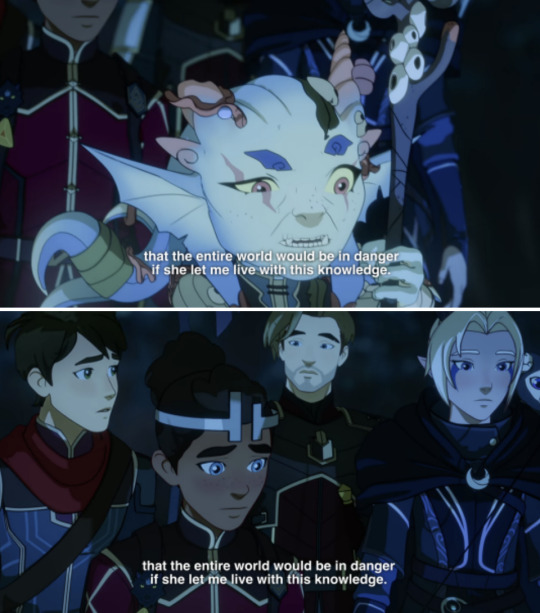
If you have knowledge, you have the capacity to share knowledge, either for a common good with people you trust, or to potentially have it twisted out of you under duress, both of which could've posed a danger if Akiyu had trusted the wrong person...

or if someone (much the same way Ezran put it together) went after her to get information but with less favourable intentions...
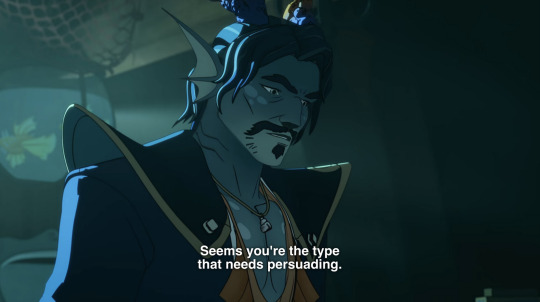
And we see that Akiyu was likely aware of this as well:
So I proposed a pact. I made a solemn promise I would die before revealing the location of the prison to anyone. And she spared me.
She ends her history lesson by reaffirming a sentiment she already expressed earlier, citing, "I didn't want to kill you, but you left me no choice. I swore an oath, and I intend to keep it" and reaffirming it here with, "So you see, when you came looking for information about Aaravos, I had no choice. If I didn't deter you, I had to kill you." At best, Akiyu's acquisition of knowledge made her prepared to put blood on her hands (if it isn't there already from previous knowledge seekers) and provides her justification in doing so.
If she could just un-know something, her life and the information would've been much safer for everyone involved, and yet that wasn't really possible. Once you know something, you cannot un-know it. (What is done cannot be undone.) Although what happened was a genuine accident, and Akiyu wanted to live, she still understood the importance of what was transpiring and why the Jailer reluctantly wanted to remove her from the equation ("The archdragons will have to kill you" / "You have to kill me. I need you to promise") to be safe rather than sorry.
And then on the flipside we have Finnegrin, who is punished for 'genuine' crimes (we can assume based on his actions that his prior ones weren't much better, but we also don't totally know for sure), spared without begging for it, and is deeply resentful of the restrictions placed upon him.
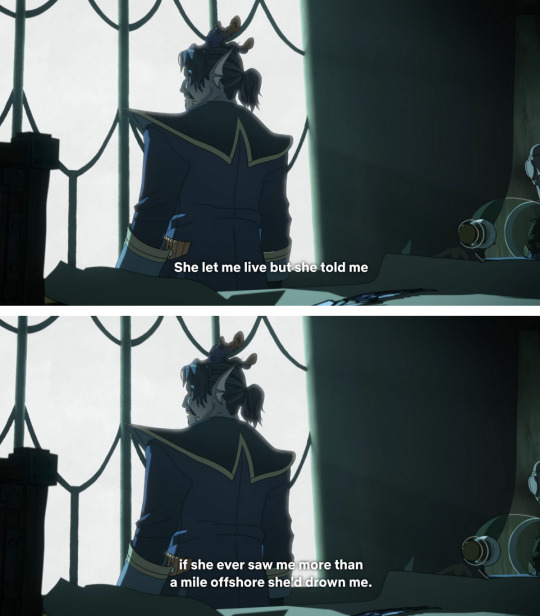
So while to get out of her predicament, Akiyu is an Tidebound elf who holds onto knowledge, Finnegrin is a Tidebound elf who wants to get out of his predicament by gaining knowledge — by any means necessary. Because knowledge is power, knowledge is agency, and knowledge is imprisonment. Which means it's finally time to talk about:
Knowledge and the Ocean Arcanum
So if S4 is about beginning to navigate both in spite of and within uncertainty, S5 is about having the safety of that uncertainty stripped away, both in creating more of it, and in removing some of it. Namely, the Ocean arcanum:
Finnegrin: What did you think you could do, boy? I control everyone on this ship. Everyone.

Callum: [Internally] Do not ask how the ocean's blue... or why their time the tides do keep. To love is simply to know this. The tides are true as the Ocean is deep.
Now I've talked more about the specific symbolism embedded in the scene where Callum internally unlocks the Ocean arcanum — the closing of his hand mimicking what he must've done to crush the slug (as well as the importance of hands and consistent gestures throughout the episode), the sea and storm and darkness receding because the arcanum is, ultimately, enlightenment, etc.
And in some ways, Callum unlocking the Ocean arcanum should be outright enlightenment with all the positive connotations that comes with. It's him achieving the goal he wanted from his first scene this season ("I'm trying to get into a place where I can connect with the Ocean arcanum"), it has all the positive light and lack of storm associations, and it allows Callum to triumphantly break free from Finnegrin's blood ice grip, for lack of a better term.
Callum: But then, you already knew that, didn't you? Because it's the secret of the Ocean itself. The arcanum.
Finnegrin: Impossible.
Callum: You helped me figure it out. I thought it would be about controlling the tides, or fighting the currents. But it's the opposite. The Ocean arcanum is about accepting there are depths you can't see, parts of yourself you can't understand, and things you can't control. You know what I'm saying is true because you were born knowing it. No matter how much you try, you'll never control everything. And that terrifies you.
I'm afraid, Rayla. What if I'm on a path of darkness?
Callum does not frame him unlocking the Ocean arcanum, nor the arcana itself, as a victory. Not to say that either of those things are bad, but that they have layers, and complications, that largely were not present (at least at the time) with the Sky arcanum. While Callum learned in S4 the dark side of potential and how consequences can catch up to you, in many ways, S5 is about deepening that understanding to the fact that no matter how much power you have, you can still not control everything. There will always be moments you feel powerless. There will always be moments you are found desperate.
He chased the Ocean arcanum because he thought, if Sky granted him potential and freedom, then Ocean would grant him control, but the truth was more complicated than that. While it did grant him control (the ability to break free from Finnegrin's spell), it also granted him a rather hard truth he'd rather not know.
The first time he cites his poem about true tides and untold deaths, he is talking about his faith and trust in Rayla — the way he views her: "If she didn't tell me, she has a good reason. [...] I trust her. Unconditionally."
The second time he recites the poem, it is about himself. The untold depths are within himself, are parts he is still trying to understand in full because they are uncomfortable truths. In many ways, Callum unlocking the Ocean arcanum is his version of Ezran's 4x03 speech (see how we looped all the way back? 'Totally' intentional I swear), that multiple things can be, and sort of have to be, true in order to gain new ground, even if there's a part of you that wishes it could be simple.
I had a speech planned for today. It was about peace and love and hope. But I think I left something out. I ignored something that was true. I denied something that is undeniable.
[I'm not a dark mage. I will never help you. -> That's the dark magic you want. Just... just let her go.]
And just like his brother, Callum can no longer deny the truth.
Callum had to accept parts of himself that he was previously denying — where they could lead and what they could do, and how he could be manipulated/coerced/controlled — in order to access the Ocean arcanum. Love both makes him stronger, by his own assessment, and weaker, per Finnegrin's. Losing control made him realize what he'll do in order to have control again, even if it's temporary, even if it might not work, even if it might have disastrous consequences, because what he gains in the process — in this case, Rayla's life and safety - is worth it to him, even if all that knowledge is also scary to him and something he's going to continue to learn how to cope with.

Callum's knowledge of himself then becomes a burden, both a metaphorical and literal chain (undoing his chains so that he can free Rayla, while knowing he's chaining himself further to Aaravos in the process).
With this in mind, the ocean arcanum thereby embodies all the facets of Knowledge we've largely been looking at across S4 and S5 in particular. It is Love ("To love is simply to know this") and self actualization/discovery ("parts of yourself you can't understand"). It is power ("The secret of the Ocean itself - the arcanum" "Impossible!") and it is a burden ("there are depths you can't see" with his hands clasped like chains not for the first or last time this episode). It is freedom, yes, but the Knowledge Callum now holds is also imprisonment.
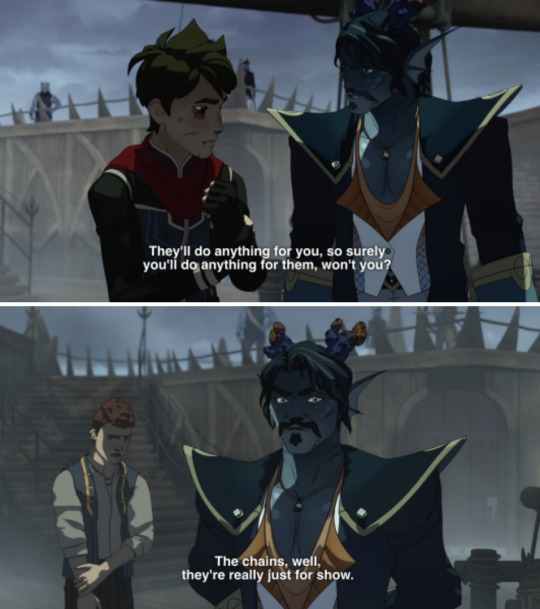
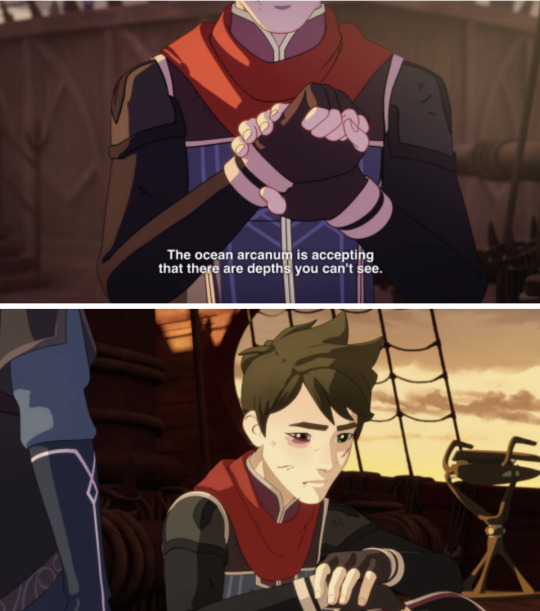
Conclusion
If you made it all this way, thank you for reading and I hope you enjoyed. While there were other elements this season (Viren's atonement and self actualization arc which begins and ends with him becoming aware of the Truth, or knowledge, of his actions, for example) I felt they were better suited to other core themes or motifs — a general theme of self actualization or the way TDP discusses truth and sight, for example, than being tethered directly to Knowledge in this way.
I expect we'll see this be continued further as the cast chases more knowledge about Aaravos and his past / power in future seasons, in addition to the potential knowledge he and other Startouch elves such as Leola passed down to humanity that had a variety of consequences.
For now, I will see you in the next meta.
—Dragons out
#tdp meta#tdp#tdp soren#tdp callum#the dragon prince#rayllum#varrow#s5#arc 2#s4#analysis series#analysis#listen i got to talk about oedipus rex so i'm happy as a clam
70 notes
·
View notes
Text
Okay. So I know I'm 2 days late for the 4th of July but I only now remembered this gem of a story.
We love to dunk(deservedly) on American pride/patriotism. But you probably didn't know how bad the story of Mount Rushmore, one of the most important places of the American mythos, is.
Like, not just bad, it is so mindnumbingly evil that it's almost unbeliveable it's not a children's movie plot.
To start off, it's built on stolen Indian land, and not "just" stolen like the rest of the country, it was extra stolen.
The mountain itself was among the natives called Six Grandfathers and it's one of the most important spiritual sites for many local tribes.
Then, the United States in the mid 19th century signed a deal with the local tribes, granting the tribes the right to their land (which belonged to them for millennia prior) in exhcange for some concessions.
The US broke the treaty immediately, a war broke out, the US lost, and signed another similar treaty, then they found gold a few years later, went to war again, won this time and did a genocide, emptied the land and sold some off it to white settlers.
Many decades later, in the 1920s, the local government working with sculptor G. Borglum(who also made monuments to the Confederacy, and was a known KKK supporter) decided they wanted to make a tourist attraction.
So they carved into a 3-times-stolen, Native American holy mountain, the faces of George Washington(who earned himself the nickname Burner of Towns from the local population), Thomas Jeferson(a racist, rapist, pedophile and owner of 260 slaves), Theodore Roosevelt(quote:"I don’t go so far as to think that the only good Indian is the dead Indian, but I believe nine out of every ten are") and Abraham Lincoln(by far the least worst one, but still a racist, imperialist, standard US president material). With dynamite.

#ramblings#not a reblog#politics#when our turn comes#we shall not make excuses for the terror#native#native american#history#4th of july#united states#united states history#mount rushmore#socialism#capitalism#communism#long posts#text post#left wing#geography#imperialism
209 notes
·
View notes
Text
Reading Grima as an Abrahamic god stand-in in the world of Fire Emblem, and how that is filling in gaps in the narrative.
Preface: this is one possible interpretation out of many, and I will be talking about this pov as a person who resides in SEA.
To get to understand this worldview though, some very dry explanations need to be done, but I'll do my best.
First, an overview of Grima.

Grima in FE: Awakening's story functions as a god of annihilation/death. They are worshiped and brought back into the world by the Grimleals, an extremist religious group in Plegia, which is visually middle eastern desert-ish.
Meanwhile, their Japanese name is actually Gimlé, a reference to the Norse mythos of the place where survivors of Ragnarok (an end of the world apocalyptic event where gods duke it out way too hard) are foretold to live. It's a super pretty place, almost heavenly.
So there is some credence here to hint that Grimleals are the extremist sect, and that Grima inherently isn't good or evil, but possibly a death god closer to the likes of Anubis or Hades. This can then explain why Plegians who aren't extremists are said to be pretty chill.
Anyway, moving on, because I need to explain the next bit to really highlight how much he looks like an Abrahamic god to a someone like me.
FE's world is structurally polytheistic. Or, Shinto Buddhist.
On the surface, FE puts forth the idea of polytheism in the form of multiple Dragons, without a singular clear, definite distinction for what threshold exactly qualifies one to be a legit God vs just-a-dragon. In fact, it can be summed up as "this one is powerful enough to do things, and/or because we decided so" by the people.
So, that tracks with the belief system in place in Japan and really, the whole of Asia in general. Polytheism is the norm, rather than mono. In this view, any being which are not human all belong into the classification of supernatural, so the question of how god-like they are matters after they are able to pass a certain threshold of power or worshiping status.
A popularity contest of spirits/gods, if you want to put it that way. In fact, lots of eastern gods irl are like this. Power often doesn't factor into things, since these gods are very closely associated with nature in some form, and their popularity in history is very dependent on events.
In fact, Japan follows Shinto Buddhism, a polytheistic belief. Technically made of 2 parts.
Shinto supplies the idea that Gods (or rather, kamis) in general cannot be perceived, and that they must be loved and nurtured to gain their favor. Disregarding them brings instead disharmony and destruction. Shrines are one such places where the love and nurturing or the disregard can be seen/done. (Thebes labyrinth, anyone? 😉👌)
The other, Buddhism. Also polytheistic due to reframing gods as just other beings trying to break out of the cycle of samsara. Buddha is technically not a god, but a title, and an idol to look to to remember the teachings of how to break out of this cycle, by understanding suffering and how to end it.
In some ways, Naga, the biggest defacto "god" which is treated as the 'proper' God by the narrative, is actually more of a Buddha. Her voice lines in FEH even points to this:

Meanwhile, Libra uses the plural, gods. Frederick's famous crit quote is "Pick a god and pray."
That is what I mean by FE being structurally Shinto Buddhist.
Meanwhile, Abrahamic religion is monotheistic.
Without getting too deep into the details and scholarly debates of it, or even the multiple branches of religion, the singular God in this family does not want his followers to turn their eyes towards other false gods. One is meant to devote themself entirely to this God, follow his teachings and live a life he deems worthy to live with him in the beautiful, heavenly afterlife.
Failure to do so will mean a divine retribution of sorts, but often in the form of eternal damnation.
Another noteworthy bit, Abrahamic religion originated from the place we call the Cradle of Civilization, also known as the Middle East. Which, you know. Deserts.
And now, the pieces of Grima being a Abrahamic god stand-in starts to form. And that then explains a lot of other mundane unexplained bits too.
Basically, Grima is the patron deity of the Plegians, who reside in the harsh desert.
If we assume that normal Plegians are pretty chill despite Grima being associated with straight up annihilation, then a pretty good extrapolation would be that Grima is a watcher type deity of the afterlife for their worship. This type is typically popular as they soothe the anxiety of what happens to a person after death, explaining that there is something else other than pure emptiness, which frankly can kick many people's existential dread into overdrive.
Which, if one really thinks about it, the Abrahamic religion and their God kind of is this.
God watches a human, then judges them for their actions in life when their time is up. In some interpretations afaik, God can also be seen as a 'system' or a 'higher conscious', but the idea of being able to join with him is still the same. This is still the ultimate honor and bliss, ie, heavenly.
But in order to do so, one must wholly devote themself to him. Spread his word. Ignore all other Gods. You know how it goes.
With Grima, this bit manifests in how Grima kills Naga in the Future Past DLC. Even Tiki became a target, who wants to become the next Naga in it. (Which btw this wouldn't make sense unless one treats the word, Naga, as a title, which tracks.)
So. In conclusion.
What I'm trying to say here is that Grima is easily read as a monotheistic, or even a Christian god to many people on this side of the planet. Because there has been precedent in extremism when it comes to religion associated with Abrahamic religion, and this is how it's being expressed through the writers when they create FE.
And yet, because either the world of FE is structurally shinto buddhist, or the writers are, this is the result, and why I have interpreted Grima as this.
There are also elements of that mistreatment of a god narrative going on in FE:A that I think is worth talking about for Grima, too. I'm almost certain that the writers are not saying Grima is inherently evil, in fact, the narrative of good and evil in FE is often easily explained by characters being dreadfully flawed, and even human. And because of how Gods have this piece of humanity in them, it's possible for so many narratives to be the way they are.
And maaaybe why they decided to put Grima in a cat costume for Halloween banner with all the funny lines that comes with them. I think.


And that's about it, really. Ask is always open. Thanks for reading! 🎃🎃
69 notes
·
View notes
Note
surprised no one has chosen this yet. could you do the monument mythos, for the analog horror keyword?
Monument Mythos Headmate
pt: monument mythos headmate
reminder beings will almost definitely not turn out exactly as described, and these can be edited and changed as needed.
apart of the analog horror keywords

divider credit + picrew credit

“ The monuments…their alive “
Name: Icarcus , Abraham ,  Lincoln , Abe , Adam ,  Abner , Abram , Alex , Lowell , Graham , Gary , Damion
Age: 22
Pronouns: Ae/Aer , Vae/Vaer , Dae/Daer , Aey/Aem , Ahey/Ahem , At/Ats , Bey/Bem , Hey/Hem , Xe/Xem , Xe/Xry , ☄︎/☄︎s , USA/USAs , 🇺🇸/🇺🇸s
Gender: Transmav / Evomav , Idiotgender , Menoverique , Icarusalis , Puraemonium , Cagerapic , Beartrapgender , Chokrypt , Neverendingaesic , Gendercimiterium , Nostalgistoric , Historicagender , Histomajoric , Histologic
Attractions: Fulvian , Gambelier Attraction , Info- , Measured Attraction (Historical Knowledge)
Other IDs: DissoUSA , Dissocountryaccent
Species: Human + Statue Alterhuman
Role: Grounder , Gatekeeper , Protecter
Aesthetics: Analog Horror , Digital Horror , Americana. , Vintage Americana , 50s Suburbia
pt: name , age , pronouns , gender , attraction , other ids , species , role , aesthetics





tags: @bahtive & @drowntowns
#build a headmate#build an alter#alter creation#headmate creation#willogenic#build a system#bah#bahtive#✦ member#🎼 mod 🎹#ANTI RQ#ANTI RQ headmate pack
11 notes
·
View notes
Text
Valhalla is not heaven, and other reasons fascists are dumb dumbs.
The utterly, bewildering, so funny it's depressing thing about neo n@z1s and blanc enthusiasts being so fucking quick to appropriate Norse iconography as a symbol of their "proud heritage" is that they consistently demonstrate a grasp on Norse Mythology as deep as the Marvel Cinematic Universe does. Not a dig on the MCU, but, let's just say creative liberties is an understatement when it comes to representing Norse Mythology.
The primary point of interest boils down basically to the concept of the "exhalted warrior death." As fascism is the ideology of hero worship, on a surface level, this makes sense. Old Norse Culture was one largely defined by conflict and vikinging as a trade.
Many Norse beliefs are shaped by, designed to inspire and exhalt the warrior who fights without fear. Their society in part relied on "the hero warrior."
Couple things though:
1. Not all Norsemen were vikings, and you REALLY aren't one.
You think the Norse belief system was so heavily lazer focused on a single profession in what needed to be an entire functioning community everyone that wasn't a viking was poopooed to damnation and/or a dishonorable life? No bitch. "Hel" in Norse mythology is just where the dead ARE. It's a very morally neutral place to be. Hel be vibin'. Odin, Freya, and possibly Njord were collecting souls for a very specific reason. That being . . .
2. The souls of warriors were being brought to Valhalla (among other places) to train for a final battle THEY WERE DESTINED TO LOSE.
Y'all fucking forgot about Ragnorok didn't you? The souls in Valhalla are being conscripted to a suicide mission. It's a place of honor to be chosen, but it's not a reward.
The training is apparently honestly a bitch in a half in it of itself supposedly. I guess you get god mead, though. Sit next to Odin at the big boy table, maybe. An afterlife of pain and awaiting doom for beer and for daddy to notice you.
That's the thing, though. Valhalla isn't supposed to be Heaven. It aligns with many other Norse Myths in that it exhalts to bravery in the face of certain annihilation. Valhalla as a function of beleif designed to psychologically break past the human instinct to prioritize self-preservation. The quality in which it exhalts is not the hero's death, but embracing doom. THAT'S WHY Odin chose warriors who died WITH WEAPON IN HAND, as in, they already faced one destruction, they can face another.
The army of Valhalla weren't even the only deaths of honor Odin recognized one could achieve. The Volva were all very much in Hel once they died, and they are all distinguished as Odin's special little future-seeing squad in the mythos too. And that's JUST Odin, ignoring the other gods who chose souls for their armies.
Norse mythology, ironically to the point of head-exploading farce, spits in the face of the concept of the Hero's Death as defined by fascism. "Dying for the cause" is a Christian/Abrahamic value that they are retroactively interjecting into Norse belief because historical self-insert fanfiction that is the Arian Mythos. There's no fucking point in training and fighting in Ragnorok, everyone is destined to fail, everyone knows it, and that's the fucking point.
The concept of Ragnorok and Valhalla was not even universal among the Norsemen. The inevitability of death and rebirth is just kind of a given as a natural truth in most pagan beliefs. Everyone you know and love is going to die, and then something else will come from the ashes. Literally "chill bro it be like that sometimes."
And if that's not enough to convince you fascists don't actually know shit about Norse mythology, I can tell you all about how fucking gay it is.
#norse magic#norse loki#norseman#norse deities#norse polytheism#gay pagan#paganism#eclectic pagan#pagans of tumblr#politics#fuck facists#facism#anti facist#norse folklore#norse mythology#odin allfather#odin deity#odin#fields of valhalla#witchythings#witchlife#pagan witch#traditional wicca#wicca#loki god of mischief#vikings#paganlife#baby pagan#pagan wicca#wicca altar
173 notes
·
View notes
Text
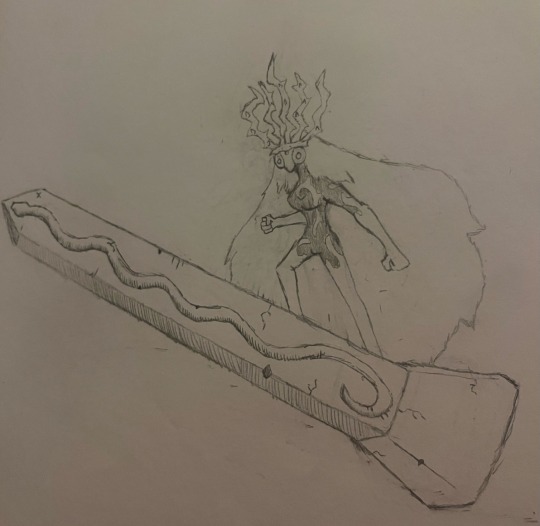
Asherah, the original mother goddess of the early Semitic mythos. She was the wife of the supreme god El. Asherah birthed the Canaanite pantheon, from Baal and Astarte to Yam and Mot, all of them were born from her union with El. Asherah’s origins are unknown, however it’s believed that she was the feminine aspect of El. In one of the few surviving myths, Asherah is shown as Yam’s biggest supporter for the throne of the chief god. Her epithet of ‘Asherah of the sea’ illustrates just how important their relationship was. Despite her support, Yam ultimately loses to Baal for the throne. Asherah in modern abrahamic faiths was reduced to a false idol, with her ‘poles’ being targeted and destroyed.
Asherah is the earliest depiction of the Mother Goddess trope, with her role in Canaan being so influential it affected the religious landscape. The Mother Goddesses became a ubiquitous feature among polytheistic religions, to the point where the absence of one is something to note. Though her name was demonized in modern times, her essence still lives on in her descendants faiths. As Eve from the garden of Eden is proposed to be derived of Asherah. As El was the predecessor of the Abrahamic God, Asherah’s relationship to the omnipotent deity has become a focal point for her. Her legacy may even live on in the feminine aspect of modern god: Shekinah, and the gnostic Aeon: Sophia.
#art#character design#mythology#asherah#athirat#semitic#canaan#canaanite mythology#semitic mythology#judaism#christianity#mother goddess#goddess#tree god#false idols#fertility god#gnosticism#abrahamic religions#abrahamic mythology#deity#primordial waters
30 notes
·
View notes
Note
even more appropriate that mina's name (wilhelmina) means vehement/resolute protector
I fucking ADORE the names in this book, tbh. Bramthaniel really said 'Hold on let me Maximize The Symbollism' for every one of his beloved OCs.
Just off the top we've got:
Lucy: White, light, bright. References the fall of Lucifer and positions her as a star on the cusp of both day and night, prior to her turning. Shares meaning but not etymology with Gwenhwyfar/Guinevere.
Arthur: A bear of a man, noble and powerful, but condemned to mourn the betrayal of the woman he loves through no fault of hers or his, but rather, the intervention of a foreign man. So, that's literally just King Arthur.
John/Jack: There are a lot of Bible guys named John but I've decided to use John The Baptist the because he was also a weird cutting edge philosopher hermit who primarily existed to prop up other figures in Christian mythos, but unlike a lot of them, we know this particular wonk existed because there are a lot of legal document about his execution. Unlike the proverbial Jack Of All, a mythological figure who had every imaginable skill and constantly escaped traps of his own making by the skin of his teeth (see also: Jack Seward's Weirdly Erotic Relationship With Candles)
Jonathan: Bro is fully named after The One Biblically Acceptable Gay Man, and spends his arc clinging to the divine spark of his love for Mina, certain of its purity in spite of everyone and everything around hem screaming that his love is profane. This shit writes itself.
Mina: Not just a protector, but a warrior-protector. And not just a warrior protector, but the literal contemporary QUEEN OF VAN HELSING'S HOMELAND AT THE TIME. I know we all keep calling her a Queen, but I want us to really remember that Bramothy and VH were calling her a Queen unironically.
Abraham (VH): Okay this one is by far the funniest because unlike the rest, the symbolism here is about as subtle as a 14 year old trying to name their Naruto OC using Google translate. Setting aside Bram's own name and his father's name and VH being physically described as looking like Stoker. Abraham is, of course, The Old Dude From Which The Major Global Religions Descended. Hence him being older and more informed than everyone else, but also talking with a degree of nonsensical allegory that anyone who had to translate ancient texts into modern language growing up knows is the fucking worst even when you DO finally understand it. Also this is probably a factor in the weird obsession with 'his descendants' in pop culture.
Van Helsing: A foreigner of a foreigner, his name is Dutch for 'dude from Sweden' but specifically means 'dude whose family came from a particularly barren part of Sweden like 8 generations ago.' He's a real Immigant Success Story, is old Abe.
But we can do better still.
See, at the time that was more or less everything Abe's surname had going in (as far as I'm aware while not doing any additional research).
But today, the Anglosphere does know one more thing about Hälsingland, Sweden.
See, the capital* is REALLY popular this time of year for their.
Ritual bonfires.

You might say he's a stubborn old goat. Maybe even a criminal one!
*Hälsingland is a historical district folded into the modern county of Gävleborg, of Gälvebocken fame.
179 notes
·
View notes
Text
Know what that means?

Andras
one of 63 demons summon by King Solomon son of King David from bible fame
Abrahamic mythos are on the table fellas
#1 Lucifer and Devil and Satan are different things. Lucifer is the morning star the prideful one who was driven out of heaven and plunged down to Hell. Satan is a title given to a being whose duty is to tempt and tamper with human faith ( their personal reason for doing it... varies ). Devils are just devils
#2 no I don't wanna hear about your Jesus esper idea I've heard enough of those. There's other things that can become espers. Other things happen in the bible you know
I don't think we're gonna get anyone from the mythos this year tho
maybe next year. That'd make sense
33 notes
·
View notes
Text
So kinda funny life thing lately
Recently my writing partner is going through essentially Jewish bootcamp (his wife is going through Orthodox conversion so that if they were to have kids theyd be considered Jewish; ironically though due to customs that means he has to do a SHIT ton of studying and scholar shit since they basically formally teach the culture and customs and rules and history and beliefs and so forth and due to his family situation, he was never cultured in it)
And Ive just been doing a lot of my casual active studying of Buddhism and reading into some of the history of it and all cause like
I honestly identify more as Buddhist than Chinese at this point and have largely kinda let go of the "I was never cultured in it due to my family" of my ethnic culture and accepted rather that while I may have missed out on that a lot of my childhood and life sitaution actually always had me set up for Buddhism + its honestly something I culturally identify with and understand and vibe with better
And so I like to learn about the history and different perspectives so Ive been doing light reading
And its really funny cause randomly we will be like "Heres the cool things about it and things I like and the neat shit" but also theres some of the more mythos / lore and all that we both respectively side eye a bit
And so every so often we just chat about things were finding and perspectives and largely have open space to tell the other about topics and discussions from the perspectives of Buddhism and Judaism
And its really interesting seeing some similarities, differences, and - honestly my favorite discourse to read people on forums talking about - is if Abraham and Brahmins are related or if its coincidence
But its a really neat experience cause both of us grew up feeling estranged from our cultures as our abusive households never really raised us let alone in any cultural manner, and so its a really nice healing thing for the both of us to have our cultural niches that we are either fitting more naturally into (my case) or being properly immersed into
And its really nice being able to celebrate that by exchanging it respectfully with one another.
You know, for once, actual cultural exchange
9 notes
·
View notes
Note
I think it's really cool that the demon au stuff you're doing is Hindu mythology instead of abrahamic mythology. I am curious if you are Indian though.

thank you! and yes, born there even :0)
i talked about it a bit in one of my first posts about the AU, but the fact that the demon au is hindu instead of abrahamic is directly because i'm indian and have zero experience with abrahamic mythos, hehe.
i'm from kerala, a southern state, and my background is in hinduism. thanks for the ask though, it is certainly worth elaborating on!
53 notes
·
View notes
Text
THE BEGINNING OF THE WORLD - romanian edition

There can be no religion without culture and no culture without religion
(that being said, all cultures around the world have their own myth of creation, pre-christian or any abrahamic religion that has spreaded around the globe)
Our myth speaks of a primordial sea... or, rather a primordial ocean, seeing how big it was. In the darkness of the universe, two beings (twin brothers, most oftenly regarded) watched this sea of nothingness and became inspired.
It's worth to mention these beings names: FÂRTATUL and NEFÂRTATUL (yes, if this second one seems.familiar, it is because after christianity was adopted in the region, it became a nickname for the devil, as it was bad to call the fallen angel by any of his given names: devil or lucifer). But mistake not the paganism, so vague in its lines between good and evil that these notions barely existed as well shaped concepts, with its predecesor. None of the twins is supposed to be seen as purely good or purely evil in romanian mythos.
Fârtatul asked the primordial frog, the first animal he encountered in the vast sea, to swim to its bottom and pluck out some mâl (wet sand). Hence, the land came to be.
But there was just a plain terrain, dry and unlivable. So Fârtatul talked with the primordial hedgehog, the first creature to roam the newly made earth. And it became to walk around, digging with its small paws and claws until water sparked to the surface: rivers, lakes, seas and such on. Where the land creaked under the pressure, valleys formed and the puddle of earth the hedgehog threw behind in its search for water became mountins.
However, the twin brother, Nefârtatul, mumbled about the darkness around (for he kept bumping into things in this new world and couldn't see a thing). Therefore, he made the Sun and the Moon, and so the day and night appeared, lighted more or less by their patron own.
Yet, something still was missing. And both Fârtatul and Nefârtatul tried to fill the gap they felt existed. Each made creatures they soon deemed imperfect. First were the giant CĂPCÂNI (later known in our fairytales as căpcăuni). These were humanoid beings, tall enough to catch their feet into the mountains and fumble to the ground. They had half of a human face and half the one of a dog and they were bad for they were violent and mean.
So the brothers raced again with each other and created the BLAJINI. Cute, sweet, dwarves, as the name enables (blajin in romanian means kind, nice). But they couldn't fetch for themselves and the primordial twins took them into their own realm.
Next came the beings with multiple arms, and even later, the halves/halves (half human, half other animals). Until humans were created.
Legends say both Fârtatul and Nefârtatul created humans at the same time. To be like them in all aspects. Therefore some humans are more like Fârtatul and some, like Nefârtatul (remember, there is no good vs. evil concept here).
<<<<<<<<<<●>>>>>>>>>○<<<<<<<<<●>>>>>>>>>>
more will come soon :)
and also soon i shall find in my mess of a computer and link the sources 😔😪
#romania#romanisme#romanian paganism#romanian myths#romanian culture#romanian folklore#cultures around the world#creation myths#eastern europe#balkan#myths and legends#romanian legends#at the beginning#paganism#believes#ancestors#pls don't let this flop
93 notes
·
View notes